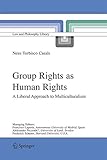Group Rights as Human Rights [electronic resource] / edited by NEUS TORBISCO CASALS.
Series: Law and Philosophy Library ; 75Publisher: Dordrecht : Springer Netherlands, 2006Description: XVI, 263 p. online resourceContent type:- text
- computer
- online resource
- 9781402042096
- 340.1 23
- K201-487
- B65
- K140-165
 eBooks
eBooks
Cultural Minorities and Group Rights: Contested Concepts -- Towards an Alternative Notion of Group Rights -- Understanding Multiculturalism: Which Groups Qualify -- Tolerance, Neutrality and Group Rights -- On the Relevance of Cultural Belonging: Group Rights as Instrumental Rights and as Fundamental Rights -- Multiculturalism, Ethnic Minorities and the Limits of Cultural Diversity.
Liberal theories have long insisted that cultural diversity in democratic societies can be accommodated through classical liberal tools, in particular through individual rights, and they have often rejected the claims of cultural minorities for group rights as illiberal. Group Rights as Human Rights argues that such a rejection is misguided. Based on a thorough analysis of the concept of group rights, it proposes to overcome the dominant dichotomy between "individual" human rights and "collective" group rights by recognizing that group rights also serve individual interests. It also challenges the claim that group rights, so understood, conflict with the liberal principle of neutrality; on the contrary, these rights help realize the neutrality ideal as they counter cultural biases that exist in Western states. Group rights deserve to be classified as human rights because they respond to fundamental, and morally important, human interests. Reading the theories of Will Kymlicka and Charles Taylor as complementary rather than opposed, Group Rights as Human Rights sees group rights as anchored both in the value of cultural belonging for the development of individual autonomy and in each person’s need for a recognition of her identity. This double foundation has important consequences for the scope of group rights: it highlights their potential not only in dealing with national minorities but also with immigrant groups; and it allows to determine how far such rights should also benefit illiberal groups. Participation, not intervention, should here be the guiding principle if group rights are to realize the liberal promise.


